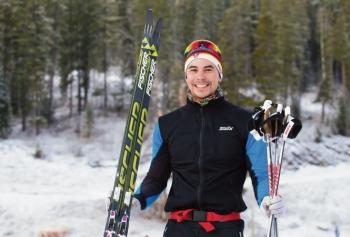By Sam Laskaris
Windspeaker.com Contributor
CANMORE, Alta.
Competing at a familiar location helped Jess Cockney add to his career cross-country skiing accomplishments. Cockney, 27, participated at the U.S. sprint nationals held earlier this month in Soldier Hollow. The Utah-based facility is where the cross-country skiing competition was staged for the 2002 Winter Olympics.
Cockney (Inuit) was born in Yellowknife, but since the age of seven has lived in Canmore, Alta. He captured two medals at the U.S. meet. He won the gold medal in the 1.5 kilometre skate sprint, and captured the bronze medal in the 1.5 K classic sprint.
For Cockney, it was the first time he had raced at Soldier Hollow, but the member of the Canadian national men’s squad is familiar with the venue.
“We do many of our altitude training sessions there,” Cockney said. “We’ve gone there four times going back to 2012. Each altitude training sessions is two to three weeks. It was kind of brand new competing there, but I was pretty comfortable having trained there so much before.”
Cockney, who has been a member of Canmore’s Foothills Nordic Ski Club since 2008, said this year’s U.S. sprint nationals, which attracted about 600 entrants, was an important event on the sporting calendar. About 150 Canadians competed in the event as it served as a qualifier for various prestigious upcoming junior, under-23 and senior competitions around the world.
With his efforts, Cockney earned the right to compete at next month’s world championships in Finland, as well as World Cup events in South Korea and Estonia, both in February.
Cockney is especially thrilled to take part in the world championship, which begins Feb. 23 in Lahti, Finland. This will mark the second time he’s competed at the worlds. He also took part in the 2015 world meet in Sweden.
“I did quite poorly,” he said. “I wasn’t competitive in any of my (three) races. Cockney felt his performances were affected by the fact he had been participating in too many events that year.
“At that point in the season I had missed a lot of the training sessions because I had been competing at other races,” he said. He’s since realized that in order to obtain better results, more training is required instead of more competitions.
“For me that’s becoming more and more clear,” said Cockney, who had also represented Canada at the 2014 Sochi Olympics.
As for this year’s world meet, Cockney said it is unrealistic to expect any podium finishes from him.
“It’s so deep a sport,” he said. “It sounds a bit outrageous. And it doesn’t sound flashy, but to be in the Top 30 is a huge accomplishment.” So that is what he is aiming for.
Cockney, who took up skiing at the age of three, realizes he doesn’t have much time remaining in the sport. He’s hoping to retire immediately following the 2018 Winter Olympics in South Korea.
“Once I’m done I have my eye on post-secondary education,” he said.
Cockney graduated from high school back in 2007. A couple of years later he started taking some online classes through Athabasca University. But he hasn’t taken any courses the last two years.
Since 2014 Cockney has also been an athlete mentor with Classroom Champions. The program allows him to have monthly video sessions with students from across Canada. He speaks to them on various issues, including goal setting and healthy living.
During the 2016-17 school year Cockney is working with six schools, based in Alberta, British Columbia, Ontario and Quebec.
“Most of my work with this program has been with schools on reserves,” Cockney said.
Though he enjoys being a role model, Cockney does not believe he provides the inspiration to get more youth into elite cross-country skiing. Or any other sport for that matter.
“I’m not sure it gets them inspired to join a high performance sport and train 900 hours a year,” he said. But that is not what he is aiming to accomplish in his dealings with Aboriginal youth. He is keen to tell his story and discuss his life in order to show them, regardless of where they come from, that they should be responsible citizens, aim high and strive to achieve their own dreams, no matter which field they eventually want to pursue.
“I think that’s more important than getting them into a sport,” he said. “Even for me sport is just a small part of me. And it’s not going to be there for me after I’m 30. I’m hoping they can become world-class students and then after that world-class adults.”

